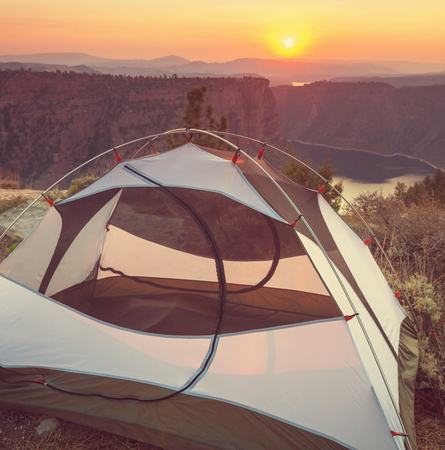Understanding Campsite Types in the UK
Before you start pitching your tent or booking a spot for your caravan, it’s crucial to get to grips with the different types of campsites available across the UK. Not all camping experiences are created equal, and the right choice depends on your expectations and level of adventure. The main categories include wild camping, caravan parks, and glamping sites, each with its own legal framework and practical considerations.
Wild Camping: For those seeking solitude and a true back-to-nature experience, wild camping—camping outside designated sites—is an appealing option. However, unlike Scotland where wild camping is generally permitted under the Scottish Outdoor Access Code (with some sensible restrictions), it is mostly prohibited in England, Wales, and Northern Ireland unless you have explicit landowner permission. It’s essential to respect local laws and always follow the ‘leave no trace’ principles.
Caravan Parks: If comfort and convenience are high on your list, caravan parks are a popular choice. These range from simple fields with basic amenities to fully serviced holiday parks with showers, electric hook-ups, shops, and even entertainment facilities. Caravan parks often have strict booking systems and site rules—perfect for families or anyone wanting a straightforward stay without surprises.
Glamping Sites: Glamping (‘glamorous camping’) has exploded in popularity, offering everything from yurts and pods to treehouses kitted out with beds, heating, and even private hot tubs. While more expensive than traditional camping, glamping sites offer an easy introduction to outdoor living without sacrificing home comforts. Most glamping options operate as commercial businesses and must comply with planning regulations.
In summary, understanding these key campsite types—and their associated legalities—will save you hassle and help you avoid rookie errors when planning your UK adventure.
Choosing the Right Location for Your Adventure
When it comes to picking your ideal campsite in the UK, location is absolutely everything. Whether you’re after a peaceful escape in nature or easy access to local sights, making an informed choice will prevent disappointment and set you up for a cracking trip. Here are the key factors every camper should weigh up before pitching their tent.
Proximity to Nature
The UK is blessed with everything from wild moorlands to serene lakesides and dense woodlands. Think about what sort of natural setting suits your adventure style—do you want to wake up surrounded by ancient trees, or would you rather be a stone’s throw from a rugged coastline? Campsites within National Parks like the Lake District, Snowdonia, or the Cairngorms offer immersive experiences but may be more basic or remote.
Local Attractions and Activities
Many first-timers overlook how important nearby attractions can be. If you fancy exploring quaint villages, historic castles, or bustling market towns, look for campsites with good links to these spots. On the other hand, if you’re keen on hiking, cycling, or watersports, prioritise locations close to trailheads or lakes. Here’s a quick comparison:
| Type of Attraction | Example Locations | Best For |
|---|---|---|
| Nature Reserves & National Parks | Peak District, New Forest | Wildlife watching, hiking |
| Historic Sites & Towns | Bakewell, York, St Andrews | Cultural trips, sightseeing |
| Adventure Activities | Llangollen (rafting), Windermere (kayaking) | Outdoor sports enthusiasts |
Access to Public Transport
If you don’t drive or prefer to leave the car at home, check public transport options. Many rural sites are off the beaten path and might require a combination of train and bus journeys—or even a taxi for the last stretch. Some popular campsites have shuttle buses from major stations during peak season. Always plan your route in advance and double-check timetables; rural services in Britain can be sparse on Sundays and bank holidays.
UK Weather Considerations
The British weather is famously unpredictable—sunshine one minute, drizzle the next. When choosing your site, consider elevation (hilltop campsites can get very windy), drainage (avoid low-lying fields prone to becoming boggy), and shelter (wooded areas can provide protection from both wind and rain). Here’s a handy reference:
| Location Type | Weather Pros | Weather Cons |
|---|---|---|
| Woodland Campsite | Shelter from wind/rain | Damp ground after rain |
| Lakeside/Lowland Field | Scenic views, flat pitches | Mist/fog, potential flooding |
| Hilltop/Open Moorland | Panos & sun exposure | High winds, less shelter |
Avoiding Rookie Errors: Quick Tips
- Always research the site’s accessibility in advance—don’t assume there’ll be taxis or buses on demand.
- If you’re new to camping in Britain, err on the side of caution with weather—bring extra waterproofs and don’t camp in flood-prone spots.
- Double-check what’s open locally outside peak season; some attractions shut early or only operate weekends.
- If travelling without a car, prioritise campsites near reliable train lines (e.g., along the South West Coast Path or near Lake District stations).
The Bottom Line:
Selecting the right campsite location isn’t just about pretty views—it’s about matching your plans with practicalities like transport links and typical British weather quirks. Getting this step right means fewer headaches and more time enjoying your adventure.

3. Essential Facilities and Amenities to Look For
When choosing a campsite in the UK, it’s easy to get caught up in the romance of wild landscapes and rustic charm, but let’s be honest: a few well-chosen facilities can make or break your trip. There’s no shame in wanting a few creature comforts! To avoid rookie errors, always check what amenities are available before you book.
Toilets and Showers: The Bare Essentials
If you’re not keen on midnight dashes behind a bush, prioritise campsites with clean loos and hot showers. Most established British sites offer these as standard, but quality varies greatly. Look out for sites that mention ‘modern facilities’ or ‘regularly cleaned washblocks’. Trust us—your future self will thank you after a muddy walk in the Lakes or Dales.
Electric Hook-Ups: Power Up Your Pitch
For those bringing a caravan or campervan, or simply wanting to charge devices, electric hook-ups are invaluable. Not all pitches have them, so double-check availability. Some sites offer both EHU and non-EHU options, which might affect your pitch location and price.
Family-Friendly Features
Travelling with children? Look for playgrounds, dedicated family bathrooms, baby-changing stations, and perhaps even an on-site café or small shop for emergency snacks. Sites near beaches or with nature trails often provide info packs or activity sheets for kids too—a real win for keeping little ones entertained when the weather turns typically British.
Accessibility Considerations
If anyone in your group has mobility needs, verify whether the site offers accessible washrooms, level pitches, and step-free access to communal areas. Many UK campsites are improving their accessibility but details can vary—never assume unless it’s specified.
Pet-Friendly Perks
Bringing your dog along? Seek out campsites that welcome pets and preferably have dog-walking areas, waste bins, and even dog showers (yes, they exist!). Always check leash policies and any breed restrictions to avoid awkward surprises upon arrival.
Ultimately, knowing exactly which facilities matter most to you—and confirming they’re genuinely available—helps sidestep disappointment. A quick phone call or email to the warden before booking can spare you from classic rookie mistakes and ensure your UK camping adventure is comfortable and stress-free.
4. Reading UK Campsite Rules and Etiquette
One of the most foolproof ways to ensure a smooth camping experience in the UK is to thoroughly understand and respect campsite rules and etiquette. British campsites are known for being orderly, and there’s a strong cultural emphasis on courtesy, privacy, and environmental responsibility. Overlooking these basics can quickly mark you out as a “rookie” camper, so it’s worth doing your homework before you pitch up.
Why Rules Matter: Keeping the Peace
Most UK campsites display their rules at reception or provide them upon booking. These aren’t just formalities—they’re carefully crafted to maintain harmony among campers, preserve local wildlife, and ensure everyone has a pleasant stay. Breaking the rules can lead to awkward confrontations or even being asked to leave early, which is something no one wants on holiday.
Common Campsite Rules (and Why They Exist)
| Rule | Reason |
|---|---|
| Quiet hours (usually 10pm–7am) | Respects neighbours’ sleep; maintains a peaceful atmosphere |
| No open fires (unless specified) | Prevents wildfires; protects the environment |
| Designated recycling and rubbish points | Keeps sites clean; supports UK recycling initiatives |
| No loud music or parties | Upholds traditional British respect for privacy and calm |
| Dogs on leads at all times | Protects local wildlife; ensures safety for all guests |
| No late-night arrivals/departures | Avoids disturbing sleeping campers; maintains site security |
Cultural Expectations: Courtesy & Privacy in the British Outdoors
The UK has its own set of unspoken campsite customs. For example, Brits highly value personal space—don’t pitch your tent too close to others unless the site is packed. A friendly nod or “morning!” is welcome, but long chats might not be unless invited. Respect boundaries, both physical and social.
Recycling Protocols: Doing Your Bit
Recycling is taken seriously across the UK. Most campsites provide separate bins for glass, paper, plastics, and food waste. Mixing up your rubbish isn’t just frowned upon—it may mean extra work for staff or fines for the site. Make it a habit to read signage carefully and sort your waste accordingly.
A Quick-Reference Table: Essential Etiquette Dos & Don’ts
| Do | Don’t |
|---|---|
| Keep noise down after dark | Host late-night gatherings near tents/caravans |
| Tidy up after yourself (including dog mess) | Leave litter around your pitch or common areas |
| Respect marked boundaries between pitches | Cut through other people’s camping spaces |
| Smooth over any issues with polite conversation first | Jump straight to complaining to management unless necessary |
| Check fire regulations before lighting BBQs or campfires | Assume fires are permitted everywhere in the countryside |
| Follow local recycling instructions strictly | Pile everything into one bin “for convenience” |
Nailing these basics will help you blend in seamlessly with experienced British campers—and avoid rookie mistakes that could spoil your trip or your reputation!
5. Making the Most of Online Reviews and Local Advice
One of the biggest advantages for campers in the UK today is the wealth of information available online, but knowing where to look and how to interpret what you find can save you a world of hassle. Start with trusted UK-specific review platforms such as Pitchup, Cool Camping, and The Camping and Caravanning Club’s own site. These are well-established, with users who are generally honest about their experiences—be sure to look for reviews that mention practical details like ground conditions after rain, noise levels, or proximity to facilities, rather than just glowing praise or generic complaints.
Don’t underestimate the power of social media groups, especially those tailored to UK camping. Facebook groups like “UK Campsite Finder” or regional pages are full of real-life stories, photos, and warnings about overrated or unsuitable sites. When in doubt, post a question; you’ll often get straight-talking advice from locals or seasoned campers happy to share both the gems and the pitfalls.
If you’re already travelling or on-site, have a chat with campsite wardens or nearby shopkeepers—they’re usually a goldmine of local knowledge. They’ll know which sites flood after a bit of drizzle, which ones have a wasp problem by August, and which pubs do a cracking Sunday roast for weary campers. In rural Britain, this sort of informal advice is often far more reliable than anything you’ll read online.
Combining these resources—online reviews for broad trends and recent feedback, social media for community insights, and local chats for up-to-the-minute realities—gives you a robust system to avoid rookie errors. Don’t just rely on star ratings; dig deeper into the details and always cross-reference sources before booking your pitch.
6. Rookie Errors to Avoid
If you’re new to camping in the UK, it’s easy to fall into a few classic traps that can put a dampener on your adventure—sometimes quite literally. Here are some common mistakes to watch out for, along with simple solutions to keep your trip running smoothly:
Underestimating Muddy Ground Conditions
The British weather is famously unpredictable, and even in summer, campsites can turn boggy overnight. Don’t assume firm ground; always check the site’s drainage, especially if pitching in a field or near a riverbank. Investing in a decent groundsheet and waterproof footwear can save you from soggy misery.
Ignoring Booking Requirements
Unlike wild camping in Scotland, most English and Welsh campsites require advance booking—especially during school holidays or bank holiday weekends. Turning up unannounced risks disappointment, so always check availability and secure your pitch ahead of time.
Neglecting Local Pests: Midges and Ticks
In certain regions (particularly Scotland), midges are a notorious nuisance, while ticks are increasingly common across the countryside. Failing to prepare means itchy bites or worse. Bring repellent, consider midge nets, and always do tick checks after walking through long grass or woodland.
Overlooking Facilities
Don’t assume every site has hot showers, clean loos, or even potable water. Always read the campsite description carefully and pack accordingly—whether that means bringing extra water, loo roll, or your own shower kit.
Poor Pitch Selection
Avoid setting up camp at the bottom of slopes (risk of flooding), directly under trees (drips, sap, and bird droppings), or too close to communal areas (noise). Walk around and choose wisely; a little effort saves a lot of hassle.
Not Checking Site Rules
Every site is different: some have strict quiet hours, others ban fires or limit vehicle access. Ignoring these rules not only annoys fellow campers but could cut your stay short. Always read the small print before arrival.
By keeping these common rookie errors in mind—and planning ahead—you’ll ensure your UK camping trip is memorable for all the right reasons.

